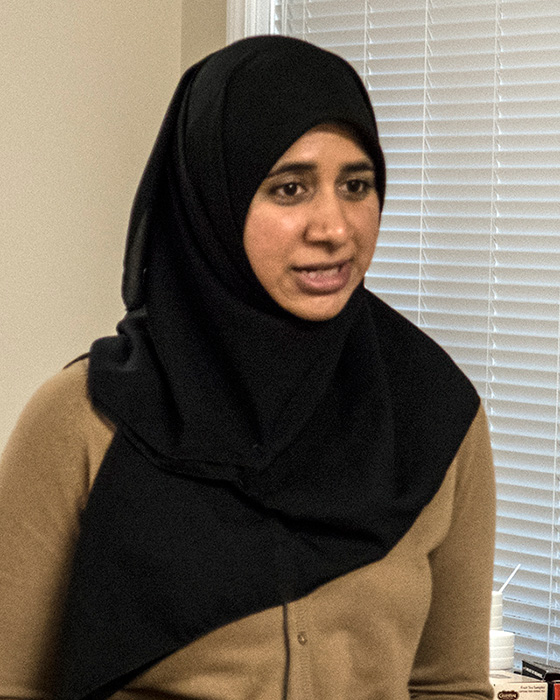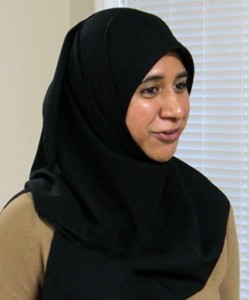Monday, May 18, 2015

Zahra Billoo is a civil rights attorney, the Executive Director of the San Francisco Bay Area office of the Council on American-Islamic Relations (CAIR-SFBA), and a leading voice for the civil rights of American Muslims. As calmly articulate as she is passionate in her beliefs, Zahra spoke about Islam, her practice of it, bigotry against Muslims (so-called Islamophobia), and her work at CAIR, which includes political advocacy on behalf of American Muslims, legal representation of Muslims with anti-discrimination claims, and outreach to people of other religions and no religion at all.
Muslims comprise an estimated 25% of the world’s population but only 1% of the population in America. Some 70% of Americans do not know a Muslim. According to Zahra, anti-Muslim sentiment has existed for a long time in America, but the attack on 9/11 exacerbated it. In the wake of the murders of three Muslim students in North Carolina in early 2015, the Washington Post reported that before 9/11 there were about 20-30 hate crimes a year against Muslims, whereas now there are over 100 a year. The same article reported that in 2013, there were more than 600 hate crimes against Jews. Jews comprise about 2.2% of the American population, more than twice that of Muslims.
Zahra said the mass media disproportionately covers Muslim terrorists, rather than other terrorists, and tends to consider Muslims guilty until proven innocent when they are accused of terrorism. She said a double standard exists in that Muslims are asked to apologize for violent acts committed by Muslims, whereas other groups are not asked to apologize for violence committed by their members. According to an article in the New York Times on June 24, 2015, 48 people have been killed in the United States by non-Muslim extremists since 9/11, whereas 26 have been killed by Muslim extremists. The story suggests that the media has under-reported attacks by right-wing hate groups, at least when compared to attacks by Jihadists, and that political pressure from conservatives has caused government entities to de-emphasize the danger of lethal crimes inspired by right-wing ideology.
Zahra said that groups such as American Freedom Defense Initiative are part of an “Islamophobia industry” that spends millions of dollars to propagate anti-Islam messages, including bus ads in San Francisco equating Islam with Hitler. A group called “Why Islam” has countered such propaganda with pro-Islam messages, including bus ads of its own.
Zahra defined Islamophobia as close-minded bigotry or prejudice against Muslims, not mere disagreement with Islam. She said one can “be in solidarity with” a persecuted community without agreeing with it. She cited several ethnic and religious communities in America that have experienced and in some cases continue to experience discrimination. CAIR, the nation’s largest civil rights organization for Muslims, seeks to counter Islamophobia in part by making common cause with such groups. In Zahra’s view, CAIR helps all Americans by asserting the American values of equality for all while advocating for the rights of Muslim Americans. Zahra describes the work of CAIR here.
Here is an example of Zahra’s legal work at CAIR. In 2010, the Abercrombie & Fitch clothing chain fired a Muslim employee for not removing her religious headscarf, or hijab, for work. At Zahra’s direction, CAIR-SFBA (joined by the federal government’s Equal Employment Opportunity Commission—EEOC) filed suit in federal court on the employee’s behalf. In 2013, CAIR and the EEOC won: the judge ruled that Abercrombie & Fitch had violated federal anti-discrimination employment law. After the ruling, the clothing company settled that case and a related one.
In June 2015, the United States Supreme Court decided a similar case in favor of the hijab-wearing plaintiff. By an 8-1 margin, the High Court ruled that Abercrombie & Fitch violated the Civil Rights Act of 1964 by refusing to hire a woman because she wore a headscarf. That statute forbids discrimination in employment because of a person’s religion. The Court indicated that an employer can violate the statute even without knowing that the employee wears the headscarf for religious reasons.
Zahra identified five pillars of the faith and practice of Islam: (1) a declaration of belief in one God and in Mohammed as God’s messenger; (2) prayer five times a day; (3) an annual 30-day period during which one fasts from sunrise to sunset every day; (4) charitable donation of 2 1/2 % of one’s savings; and (5) a pilgrimage to Mecca once in one’s lifetime. These precepts come from scripture — the Koran and the teachings of Mohammed. Imams lead prayers and give advice. Muftis (scholars) are qualified by their study of the faith to issue fatwas, which are interpretations of Islamic law. However, Zahra said there is no hierarchy of Muslim authority and no one whose religious leadership she must follow. She considers such diversity both helpful and problematic—helpful because it promotes freedom of choice, problematic in that it makes unity difficult for Muslims to achieve.
Zahra considers her faith a journey, not a destination. Pakistani Americans, her parents raised her and her brother as American Muslims. When she was seven, her parents took her and her brother on a pilgrimage to Mecca. On 9/11, when she was 17, her father called to tell her and her mother to stay home, but Zahra experienced no problems at school. As the only Muslim in her high school class, she was forced by circumstances to explain her faith, and she became comfortable doing so.
Asked what it means to be a Muslim feminist, she said that Muslim women lack human rights and that she seeks through her faith to improve their condition. She said that women and men are equal but not identical in the eyes of God and that Islam assigns different roles to men and women. She indicated that such gender roles are not necessarily restrictive. Some Saudi women don’t want to drive; all women seek dignity and respect.
All Muslims are required to dress modestly, but there is a wide variety of interpretation as to what that means. Zahra cited a Muslim bikini model in New York as an indication of the most liberal interpretation. Zahra has worn a headscarf for 21 years as an act of faith in and submission to God’s requirement. She finds other rationales unpersuasive and rejects the notion that women are more pious if they are covered. She believes that people’s clothing choices should be respected and we should be allowed to do what we want with our bodies.
Asked if atrocities committed in the name of Islam made her feel ashamed to be Muslim, she indicated that they did not. She said that Islam commands Muslims to speak out against terrorism and that she has joined many other Muslims, including its preeminent scholars, in denouncing ISIS ideology. She feels more complicit as an American in the American government’s violence than she does as a Muslim in violence committed by Muslims, inasmuch as she funds the former with her taxes. She said she believes in the text of the Koran and that anything can be twisted. She does not believe any less in democracy because it has been used to spread violence. She said strife in the Muslim world is a reflection not just of Islam but of a hundred years of colonialism and corruption, a geopolitical problem as well as a religious one.
As an example of a verse from the Koran that is commonly taken out of context, Zahra cited the prescribed punishment for a thief: cutting off the hands. She said the Koran prohibits such punishment where poverty exists, so Islamic law forbids cutting off a thief’s hands if the thief stole food in order to eat. Without addressing the propriety of cutting off a thief’s hands under any conditions, Zahra suggested that such punishment may be no worse than sentencing a petty thief to 25 years to life. In California, the “three strikes” law used to permit a sentence of 25 years to life for a person convicted of any felony (including petty theft with a prior conviction) if the person had previously been convicted of two serious and/or violent felonies. In 2012, the voters adopted Proposition 36, which changed the law to require a serious or violent felony as the third strike before a 25-to-life sentence can be imposed. Thus, petty theft with two prior serious or violent felony convictions no longer triggers such a sentence.
Asked if she would like to live in a country governed by Islamic law, Zahra said it was difficult to answer because there is no country properly applying Islamic law. She said God’s word is perfect but people are not. She was not asked how God’s word can realistically be considered perfect (or, regardless, why it should matter) if humans so consistently and egregiously misapply it. She said she believes in the way an ideal Islamic government would work but knows none that exists.
Asked why she believes that Mohammed is the last and final prophet of God, she said other prophets foretold of his coming and that his teachings say so. She acknowledged that her belief remained a leap of faith.
Asked about Islam’s treatment of apostates (those who leave the faith), she said some Muslims believe apostates should be killed, whereas others believe there should be no consequence. She says the Koran prescribes death for an apostate only if the person also commits treason, and she likened that arrangement to American law, which makes treason a capital crime. She said she does not believe in capital punishment.
Zahra graciously and forthrightly answered all our questions, including several highly skeptical ones. She said the best way to get to know Islam is to get to know someone who practices it. We got to know her, and her religion could not have had a better representative.
